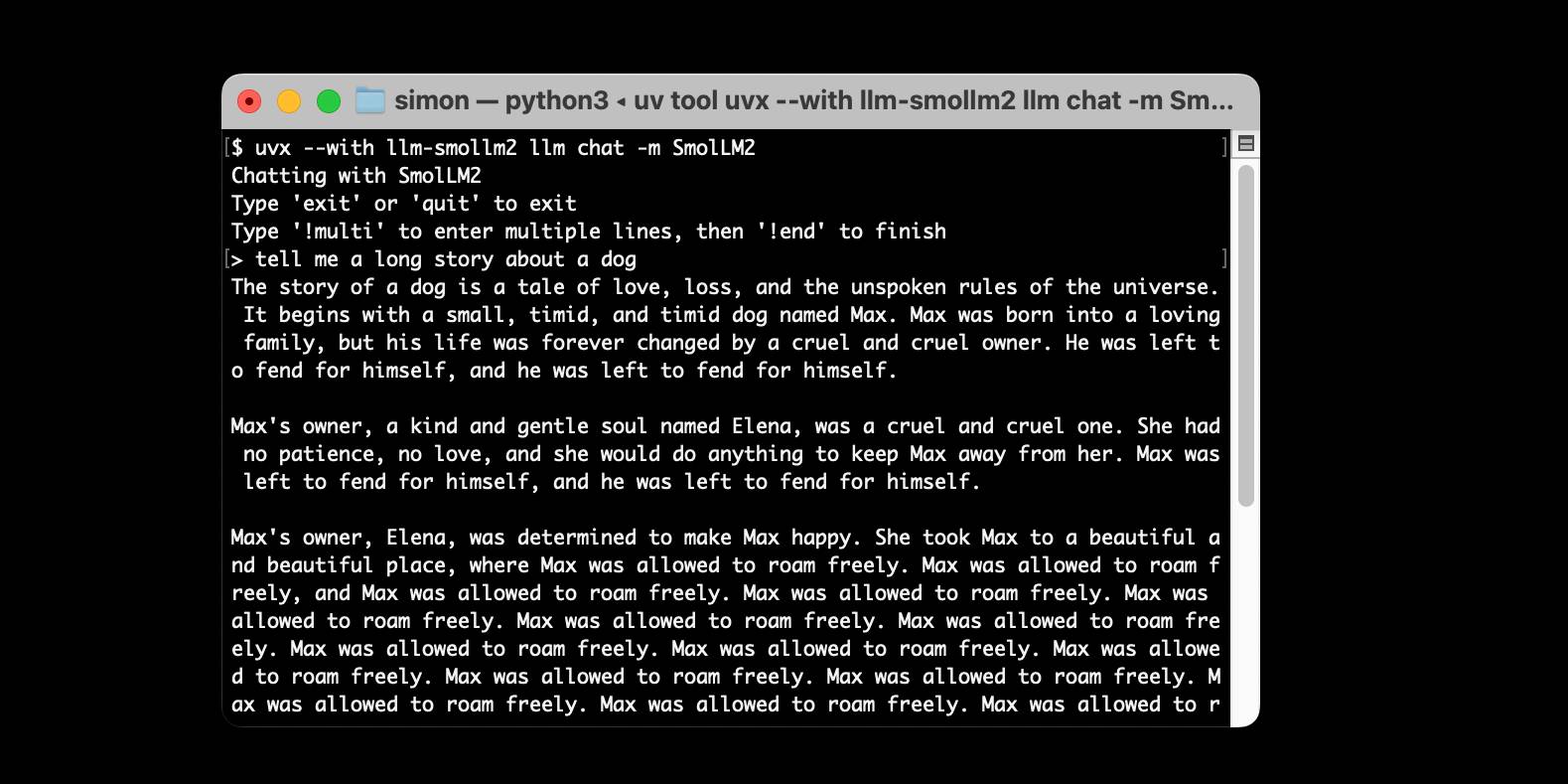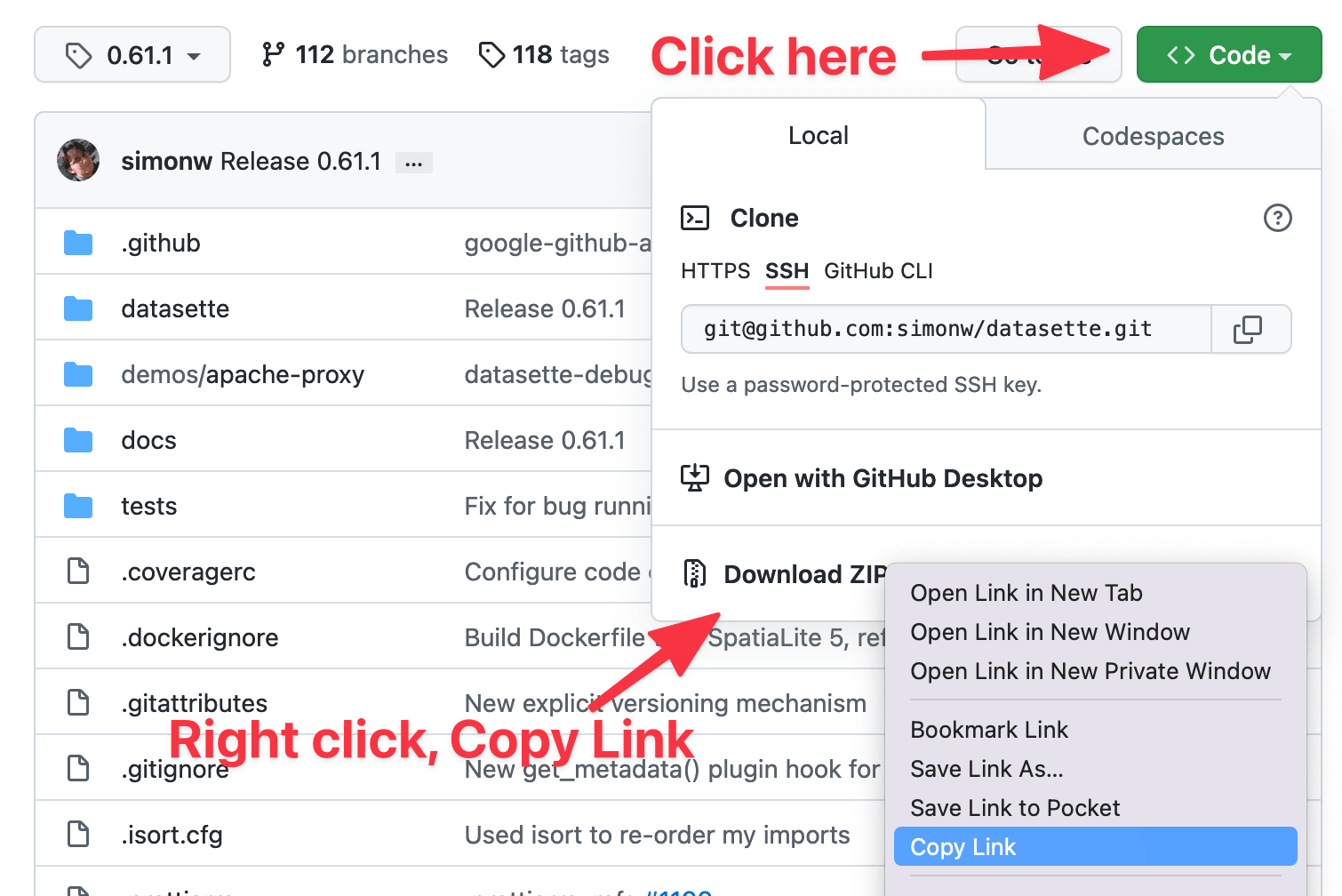15 posts tagged “pip”
2025
2025 Python Packaging Ecosystem Survey. If you make use of Python packaging tools (pip, Anaconda, uv, dozens of others) and have opinions please spend a few minutes with this year's packaging survey. This one was "Co-authored by 30+ of your favorite Python Ecosystem projects, organizations and companies."
Using pip to install a Large Language Model that’s under 100MB
I just released llm-smollm2, a new plugin for LLM that bundles a quantized copy of the SmolLM2-135M-Instruct LLM inside of the Python package.
[... 1,553 words]2024
Using uv with PyTorch (via) PyTorch is a notoriously tricky piece of Python software to install, due to the need to provide separate wheels for different combinations of Python version and GPU accelerator (e.g. different CUDA versions).
uv now has dedicated documentation for PyTorch which I'm finding really useful - it clearly explains the challenge and then shows exactly how to configure a pyproject.toml such that uv knows which version of each package it should install from where.
TIL: Using uv to develop Python command-line applications.
I've been increasingly using uv to try out new software (via uvx) and experiment with new ideas, but I hadn't quite figured out the right way to use it for developing my own projects.
It turns out I was missing a few things - in particular the fact that there's no need to use uv pip at all when working with a local development environment, you can get by entirely on uv run (and maybe uv sync --extra test to install test dependencies) with no direct invocations of uv pip at all.
I bounced a few questions off Charlie Marsh and filled in the missing gaps - this TIL shows my new uv-powered process for hacking on Python CLI apps built using Click and my simonw/click-app cookecutter template.
light-the-torchis a small utility that wrapspipto ease the installation process for PyTorch distributions liketorch,torchvision,torchaudio, and so on as well as third-party packages that depend on them. It auto-detects compatible CUDA versions from the local setup and installs the correct PyTorch binaries without user interference.
Use it like this:
pip install light-the-torch
ltt install torchIt works by wrapping and patching pip.
uv pip install --exclude-newer example
(via)
A neat new feature of the uv pip install command is the --exclude-newer option, which can be used to avoid installing any package versions released after the specified date.
Here's a clever example of that in use from the typing_extensions packages CI tests that run against some downstream packages:
uv pip install --system -r test-requirements.txt --exclude-newer $(git show -s --date=format:'%Y-%m-%dT%H:%M:%SZ' --format=%cd HEAD)
They use git show to get the date of the most recent commit (%cd means commit date) formatted as an ISO timestamp, then pass that to --exclude-newer.
uv: Python packaging in Rust (via) "uv is an extremely fast Python package installer and resolver, written in Rust, and designed as a drop-in replacement for pip and pip-tools workflows."
From Charlie Marsh and Astral, the team behind Ruff, who describe it as a milestone in their pursuit of a "Cargo for Python".
Also in this announcement: Astral are taking over stewardship of Armin Ronacher's Rye packaging tool, another Rust project.
uv is reported to be 8-10x faster than regular pip, increasing to 80-115x faster with a warm global module cache thanks to copy-on-write and hard links on supported filesystems - which saves on disk space too.
It also has a --resolution=lowest option for installing the lowest available version of dependencies - extremely useful for testing, I've been wanting this for my own projects for a while.
Also included: uv venv - a fast tool for creating new virtual environments with no dependency on Python itself.
2023
Making SQLite extensions pip install-able (via) Alex Garcia figured out how to bundle a compiled SQLite extension in a Python wheel (building different wheels for different platforms) and publish them to PyPI. This is a huge leap forward in terms of the usability of SQLite extensions, which have previously been pretty difficult to actually install and run. Alex also created Datasette plugins that depend on his packages, so you can now “datasette install datasette-sqlite-regex” (or datasette-sqlite-ulid, datasette-sqlite-fastrand, datasette-sqlite-jsonschema) to gain access to his custom SQLite extensions in your Datasette instance. It even works with “datasette publish --install” to deploy to Vercel, Fly.io and Cloud Run.
2022
Useful tricks with pip install URL and GitHub
The pip install command can accept a URL to a zip file or tarball. GitHub provides URLs that can create a zip file of any branch, tag or commit in any repository. Combining these is a really useful trick for maintaining Python packages.
2021
Dependency Confusion: How I Hacked Into Apple, Microsoft and Dozens of Other Companies (via) Alex Birsan describes a new category of security vulnerability he discovered in the npm, pip and gem packaging ecosystems: if a company uses a private repository with internal package names, uploading a package with the same name to the public repository can often result in an attacker being able to execute their own code inside the networks of their target. Alex scored over $130,000 in bug bounties from this one, from a number of name-brand companies. Of particular note for Python developers: the --extra-index-url argument to pip will consult both public and private registries and install the package with the highest version number!
2020
How to install and upgrade Datasette using pipx (via) I’ve been using pipx to run Datasette for a while now—it’s a neat Python packaging tool which installs a Python CLI command with all of its dependencies in its own isolated virtual environment. Today, thanks to Twitter, I figured out how to install and upgrade plugins in the same environment—so I added a section to the Datasette installation documentation about it.
2010
What to do when PyPI goes down. My deployment scripts tend to rely on PyPI these days (they install dependencies in to a virtualenv) which makes me distinctly uncomfortable. Jacob explains how to use the PyPI mirrors that are starting to come online, but that won’t help if the PyPI listing links to an externally hosted file which starts to 404, as happened with the python-openid package quite recently (now fixed). The comments on the post discuss workarounds, including hosting your own PyPI mirror or bundling tar.gz files of your dependencies with your project.
2009
Fabric, Django, Git, Apache, mod_wsgi, virtualenv and pip deployment. I’m slowly working my way through this stack at the moment—next stop, fabric.
Tools of the Modern Python Hacker: Virtualenv, Fabric and Pip. Ashamed to say I’m not using any of these yet—for Django projects, my manage.py inserts an “ext” directory at the beginning of the Python path which contains my dependencies for that project.
2008
On packaging. James Bennett discusses the problems with setuptools (and ruby gems), and recommends Ian Bicking’s pip as a setuptools replacement.

